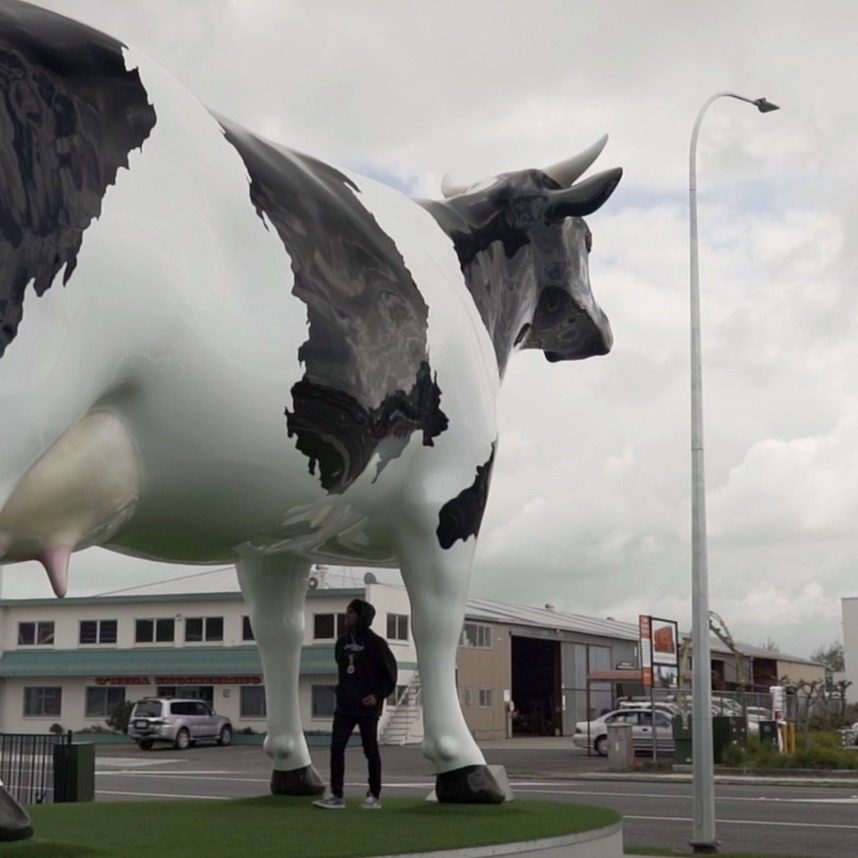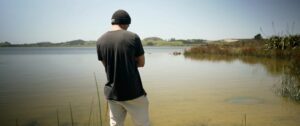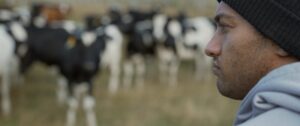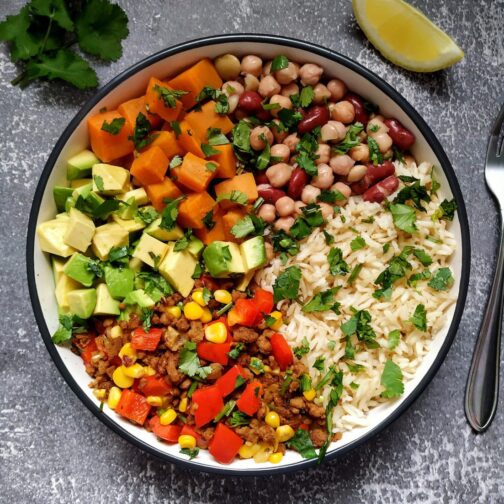
Activist and coproducer of the documentary MILKED Chris Huriwai shares some of what he’s learned about our food sustainability crisis … and what the animal industries don’t want us to know.
Not only does animal agriculture produce more emissions than the global transport sector, it’s also the driving force behind global deforestation, ocean acidification, and soil degradation. A shift to plant-based foods is a vital solution!
THE CLIMATE CRISIS
According to the Food and Agriculture Organization of the United Nations, emissions from global livestock represent 14.5 percent of all greenhouse gas emissions. Of this, about 44 percent of livestock emissions are methane, with the remaining shared between nitrous oxide and carbon dioxide. Carbon dioxide (CO2) is nothing to ignore because it persists in our atmosphere for over a thousand years. However, methane, when measured over a 20-year period, is considered 84–86 times more potent than CO2.
Because of the higher warming potential of methane and its shorter lifespan, it is the perfect target to focus on to enable a rapid cooling of our planet.
Methane has a silver lining because it is a realistically manageable gas (the methane is literally burped out by the farmed animals, so fewer animals would mean less methane). Because of the higher warming potential of methane and its shorter lifespan, it is the perfect target to focus on to enable a rapid cooling of our planet, which will help us protect the remaining ice caps or what are called ‘tipping points of no return’. Once these ice caps have melted, they’ll trigger an exponential rise in temperature, resulting in the worst impacts of climate change. Resolving the methane issue could buy us the much-needed time to heal our carbon sequestration ability for the battle against CO2. In contrast, absolute reductions in CO2 would sadly mean nothing in the short term (although are required for the long term), especially given that current levels from animal agriculture alone are capable of tipping us over current thresholds.
WATER IS LIFE
Countries are already at war over drinkable water sources. We urgently need to adopt ways of relating to the land that prioritise planetary sustainability. Animal agriculture is the world’s largest user of freshwater. This is because of the inefficiency of using water to grow vegetable protein (often in very dry areas unsuitable for farming), which we then feed to cows, chickens, pigs, and more before the animal is processed to become a product for human consumption.
Not only is it more water efficient to produce plants directly for our consumption, but deforestation also comes into effect because we’ve lost the natural systems that help to purify our water as they’ve been cleared to make way for more farms. This point is particularly important considering animal agriculture is also the world’s worst polluter of freshwater. Animals have a larger waste footprint than us, with dairy cows, for example, producing 14 times the amount of effluent in comparison to an adult human. In Aotearoa New Zealand, this is an incredible issue because the majority of natural defence systems have been lost – 90 percent of wetlands, the equivalent of losing 90 percent of your kidneys – and especially owing to the fact that there are more dairy cows than humans in the country.
In Aotearoa … the majority of natural defence systems have been lost – 90 percent of wetlands, the equivalent of losing 90 percent of your kidneys.

THE INDUSTRIES ARE DUPING US
Greenwashing in animal industries is as common as talking yourself up in your résumé. It’s as standard as it goes, some using it more effectively than others, with big corporates like oil and gas and meat and dairy among the slickest. There’s little regulation around how these industries market themselves, allowing them to advertise in schools, have partnerships with national news outlets, influence dietary guidelines, and act as gatekeepers against plant-based alternatives. Plus, they’re constantly having environmental protection legislation delayed, even lobbying for the industry to have input on plans and sometimes given free rein to rewrite legislation.
FARMERS AREN’T THE BAD GUYS
In many cases, large industries have lobby groups which help set guidelines for farming. Farmers do their best to stick to these guidelines, and it’s not their fault that these industry-set guidelines aren’t adequate to offset the environmental harm. These guidelines are designed to make the most money for the industries and governments (via tax), while attempting to maintain minimum standards for things like environmental protection. We exist in a society that accepts animal exploitation for our benefit, so farmers are subject to supply and demand.
Many farmers do not own their own means of production and by and large they’re disconnected from the complete chain of supply – like what happens in a slaughterhouse, for example. Farmers are often stuck within the industry under mountains of debt and controlled by industry leaders who prioritise their industry over their farmers. They’re a part of a much bigger system that requires radical shifts that will only be achieved through collective action.

WHAT ABOUT REGENERATIVE FARMING?
The ‘regenerative farming’ we hear about today is essentially Indigenous permaculture rebranded within an industrialised western context. Regenerative agriculture can and should be applied to plant-based food production, but it’s usually referenced by those trying to improve the environmental impact of animal farming. At its core, regenerative farming is about a circular farming system, omitting environmentally harmful external inputs like imported feed, pesticides, and fertiliser. It’s about farming sustainably, in alignment with the environment, potentially even increasing the health or biodiversity of a farm’s surroundings.
However, I’ve not seen an industrialised model where the emissions created by the farm animals are sufficiently offset by regenerative practices. Essentially, it doesn’t scale. We have too many animals and not enough land to support regenerative farming. And from an economic perspective, it doesn’t add up, especially for most farmers who are in debt and stuck in low-income commodity markets. We need to instead switch our hungry people to eating plants.
FEEDING THE WORLD SUSTAINABLY
Currently, three-quarters of the world’s agricultural land is used to farm animals or to grow food that is fed to those animals.
The reality is that we’re already producing more food than the world needs (if used equitably), and a lot of the food we’re currently producing ends up in landfill, for example. It’s clear that our current system for feeding the world prioritises private financial gains above ensuring adequate food and nutrition for all. And yes, there’s absolutely a better way to feed the world. As plant-based foods require less land, water, and energy, it’s a no-brainer! However, convincing short-sighted incumbents who seemingly care little for future generations is the hard part. Currently three-quarters of the world’s agricultural land is used to farm animals or to grow food that is fed to those animals. Despite this, animal products only account for around 18 percent of global caloric intake.
A global shift towards a plant-based food system would free up land area the size of Africa – that’s how much more efficient it is. This type of shift would mean we could return a lot of land to nature, rewilding areas to increase biodiversity, capture carbon to avoid the worst impacts of climate change, and ensure we have free recreational and spiritually enriching spaces to allow people to have a relationship with the natural world.

YOUR ROLE IN THIS
We need to accept that we do have influence in society. Some people believe that individual change is insignificant, but just like voting or throwing rubbish on the ground … every little bit adds up. Believing the myth that individual change is insignificant is often used as a way to excuse behaviour we know to be bad. Instead, learn about where your food comes from and stay politically engaged. This allows you to make informed decisions that can help achieve the outcomes you want to see in the world. It’s important for us all to be grateful for our planet and to treat the environment as our home, not something to be exploited.
Images: MILKED.film





















